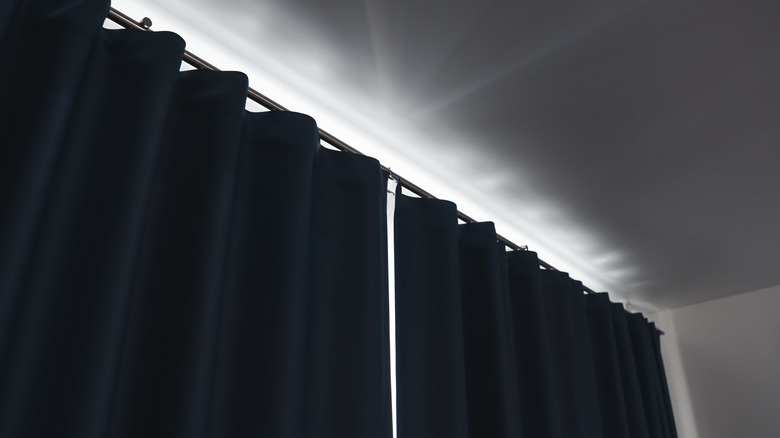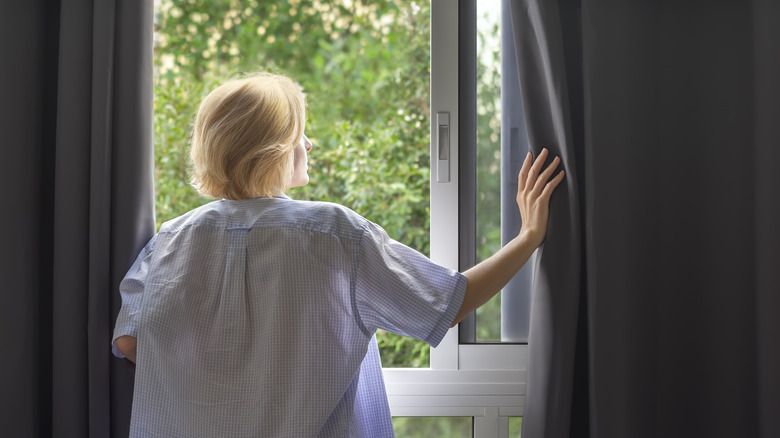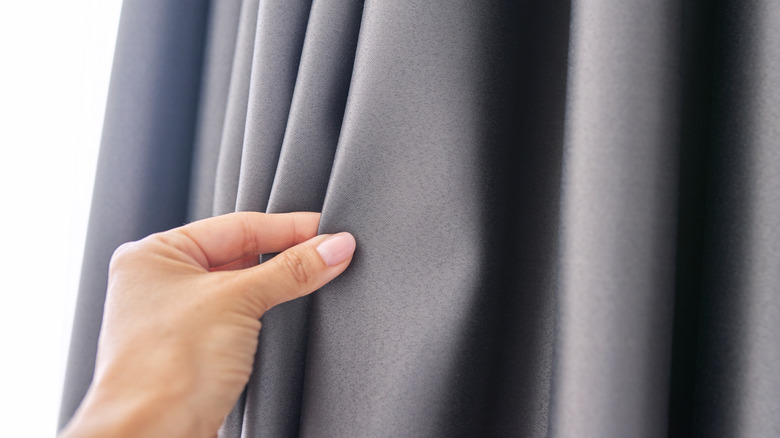Can Blackout Curtains Really Help Keep Your Home Cool In The Summer?
As summer sets in, so does the heat. While air conditioning might be able to keep up with it, energy bills can quickly mount up when running it all the time, and not every home has AC. Fans can take the edge off, but often simply move warm air around the room. Like the best of many franchise films, maybe an unexpected hero could help us on this journey. Perhaps the answer lies in ... blackout curtains! Could they really have what it takes?
Now, you might be saying to yourself, "by goodness, it can't be ... wait, what are blackout curtains?" Blackout curtains are window coverings designed to block out nearly all light from outside. Typically, they are used to create a dark sleeping space for those who need it and to reduce glare on any screens, like in media rooms. But can blackout curtains truly fend off the scorching wrath of summer heat? Research says ... Yes! Blackout curtains can indeed keep your home cooler in the summer by reducing up to 24 percent of the heat coming from your windows.
Blackout curtains are more than just cool and dark
Blackout curtains are typically made from heavy, dense materials. Many are made from multi-layer fabrics, and some have a foam-backed, opaque layer to maximize light blocking. This layered design not only obstructs light but can also help insulate against heat and cold, making them energy-efficient.
The secret to these curtains lies in the design. Blackout curtains are much thicker in comparison to regular ones. The outer layer, usually a lighter color, reflects the sun's rays back out the window, while the inner, darker layer absorbs some of the heat, preventing it from entering the room. This interferes with a process called 'solar heat gain,' which is when the sun's rays hit your window, your window absorbs the light, and then passes the heat through into your home. Blackout curtains act as a defence against this, reducing the heat gain and ultimately lower indoor temperatures.
So, as you brace for the summer heat, consider investing in blackout curtains — for a cooler, greener, and more comfortable home. Keep in mind, the term "blackout" doesn't necessarily refer to the color of the curtains. They come in a variety of colors and patterns, though darker colors will block light more effectively than lighter ones. To enhance the effectiveness of blackout curtains, you can leave windows open at night to let the cooler air into your home, then shut them in the morning to trap that cool air inside.
The verdict unraveled
The different types of blackout curtains each have their own unique characteristic to suit different needs and preferences. To name a few, there are blackout drapes, blinds, shades, and curtain liners. Drapes are similar to standard blackout curtains, only heavier, longer, and more formal. Blinds, though technically not curtains, serve a similar purpose: They fit within the window frame and can be raised or lowered to control light. Blackout shades function the same way, but are made of a single piece of material to be rolled up or down. Liners, on the other hand, are designed to be hung behind existing curtains — a great choice if you like your current ones and simply want to add the function of blackout curtains. Although all of these types are designed to block light and reduce heat transfer, no curtain can block out 100 percent of the sun's rays, but you can maximize your chances by ensuring you have the thickest fabric.
In conclusion, the use of blackout curtains goes far beyond simply keeping a room dark. They provide a multitude of benefits as both a functional and cost-effective solution for comfort and efficiency, making them an excellent addition to any home. If you're trying to maintain a cool home during the hot summer months, or simply wish for a peaceful, uninterrupted sleep, blackout curtains can significantly contribute to improving your overall quality of living. Regardless of your specific needs, investing in blackout curtains can be a step towards a cooler, darker, and more energy-efficient home.


